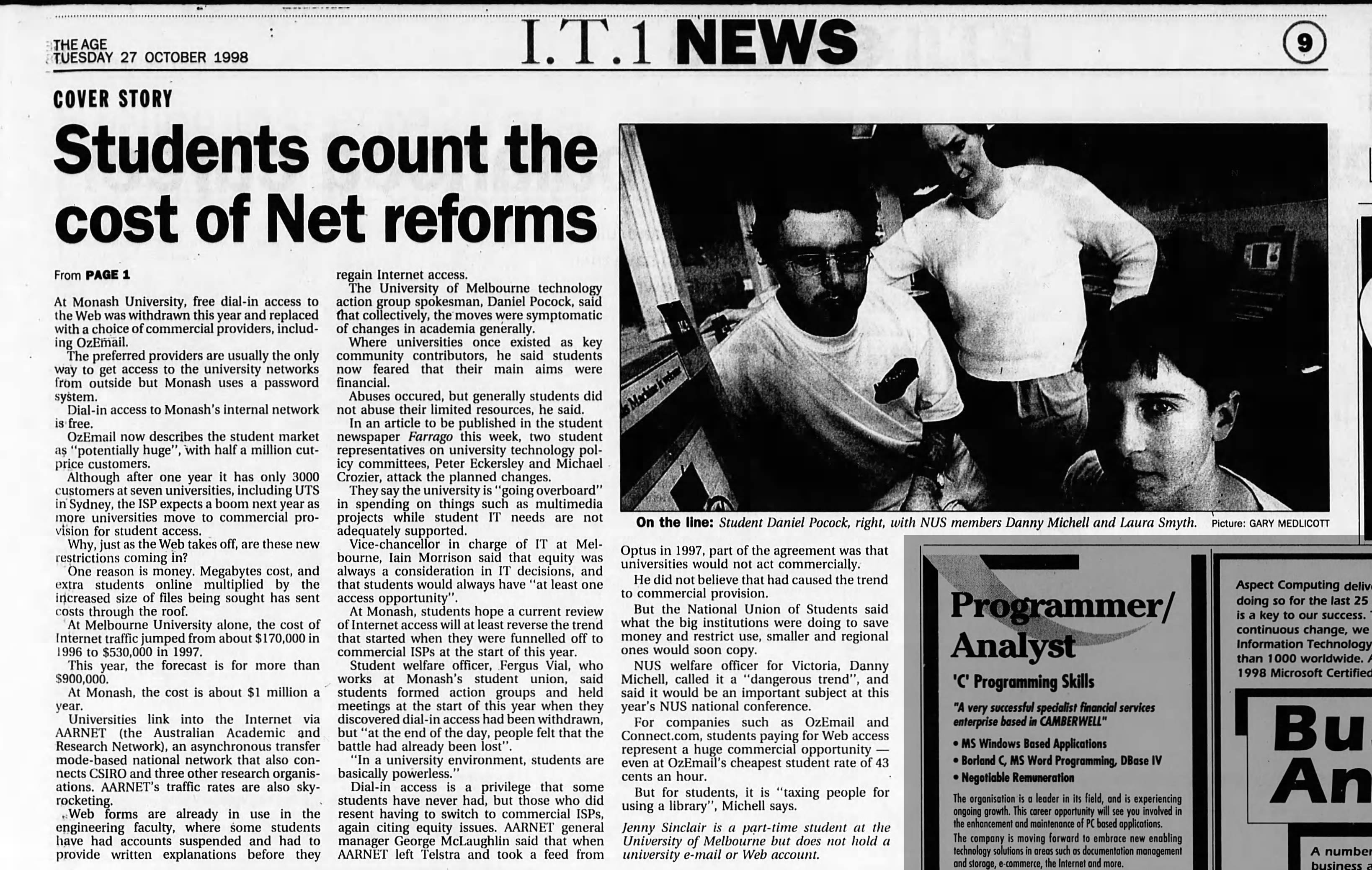Peter Eckersley, Laura Smyth & the rushed closure of dial-up Internet in Australian universities
Reprinted with permission from Daniel Pocock.
On 27 October 1998, one of Melbourne's leading newspapers featured a report about the demise of dial-up Internet for Australian university students.
Today, nobody misses the snail-like performance of their dial-up connection. Nonetheless, the events of that era are fascinating for a number of reasons.
The newspaper has chosen to publish a photo of Danny Michell, Laura Smyth and I together.
Peter Eckersley is quoted in the same article. Peter's death was a great tragedy for our industry and for humankind.
Fergus Vial and Michael Crozier are quoted in the article too.
At the time this article was printed, DSL broadband internet was not widely available in Australia. The dial-up services from the universities offered untimed Internet access for students in computer science, software engineering and some related departments like physics. The commercial ISPs were offering a timed dial-up service. The change from an untimed service to a time-limited service required students to think more carefully about planning their online time.
Within two or three years, the DSL broadband services were widely available. While we had to pay for this, DSL offers an untimed, always-on experience.
Therefore, a real concern that is not emphasized in this article is the poor manner in which the transition period was handled. The universities were eliminating their dial-in services a couple of years before any serious untimed DSL service became available. Another interesting piece of trivia is that Australia has untimed local telephone calls. Therefore, students would simply pay a flat-fee of twenty-five cents to dial the university and then stay online as long as possible.
The other key thing to note from this article is that it discusses the concerns about misuse or abuse of services provided to students. This discussion was taking place in the press at exactly the same time that Shaya Potter of Debian was using dial-up servers and Debian-owned servers for the purposes of download and sharing copies of computer games that had been obtained without respect for their software licenses.

Students count the cost of Net reforms
The Age, Tuesday 27 October 1998
At Monash University, free dial-in access to the Web was withdrawn this year and replaced with a choice of commercial providers, including OzEmail.
The preferred providers are usually the only way to get access to the university networks from outside but Monash uses a password system.
Dial-in access to Monash's internal network is free.
OzEmail now describes the student market as "potentially huge", with half a million cut-price customers.
Although after one year it has only 3000 customers at seven universities, including UTS in Sydney, the ISP expects a boom next year as more universities move to commercial provision for student access.
Why, just as the Web takes off, are these new restrictions coming in?
One reason is money. Megabytes cost, and extra students online multiplied by the increased size of files being sought has sent costs through the roof.
At Melbourne University alone, the cost of Internet traffic jumped from about $170,000 in 1996 to $530,000 in 1997.
This year, the forecast is for more than $900,000.
At Monash, the cost is about $1 million a year.
Universities link into the Internet via AARNET (the Australian Academic and Research Network), an asynchronous transfer mode-based national network that also connects CSIRO and three other research organizations. AARNET's traffic rates are also sky-rocketing.
Web forms are already in use in the engineering faculty, where some students have had accounts suspending and had to provide written explanations before they regain Internet access.
The University of Melbourne technology action group spokesman, Daniel Pocock, said that collectively, the moves were symptomatic of changes in academia generally.
Where universities once existed as key community contributors, he said students now feared that their main aims were financial.
Abuses occured, but generally students not abuse their limited resources, he said.
In an article to be published in the student newspaper Farrago this week, two student representatives on university technology policy committees, Peter Eckersley and Michael Crozier, attack the planned changes.
They say the university is "going overboard" in spending on things such as multimedia projects while student IT needs are not adequately supported.
Vice-chancellor in charge of IT at Melbourne, Iain Morrison said that equity was always a consideration in IT decisions, and that students would always have "at least one access opportunity".
At Monash, students hope a current review of Internet access will at least reverse the trend that started when they were funnelled off to commercial ISPs at the start of this year.
Student welfare officer, Fergus Vial, who works at Monash's student union, said students formed action groups and held meetings at the start of this year when they discovered dial-in access had been withdrawn, but "at the end of the day, people felt that the battle had already been lost".
"In a university environment, students are basically powerless."
Dial-in access is a privilege that some students have never had, but those who did resent having to switch to commercial ISPs, again citing equity issues. AARNET general manager George McLaughlin said that when AARNET left Telstra and took a feed from Optus in 1997, part of the agreement was that universities would not act commercially.
He did not believe that had caused the trend to commercial provision.
But the National Union of Students said what the big institutions were doing to save money and restrict use, smaller and regional ones would soon copy.
NUS welfare officer for Victoria, Danny Michell, called it a "dangerous trend", and said it would be an important subject at this year's NUS national conference.
For companies such as OzEmail and Connect.com, students paying for Web access represent a huge commercial opportunity - even at OzEmail's cheapest student rate of 43 cents an hour.
But for students, it is "taxing people for using a library", Michell says.
